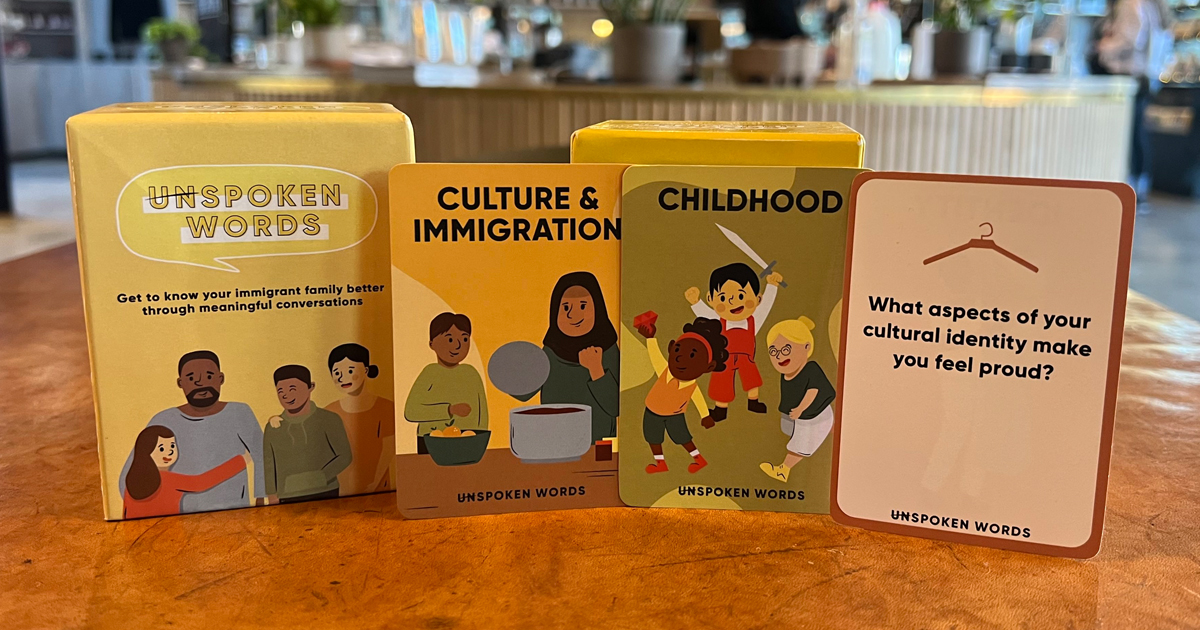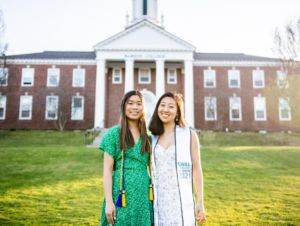Card Game Reshuffles the Deck on Immigrant Experience

Rebecca Jiang ’21 and Misha Lau ’21 did not meet until they each left Southern California to attend Babson College. But, once in Massachusetts, they found themselves quickly united by their similar experiences growing up the daughters of Asian immigrants.
“We both struggled with cultural and generational differences with our parents growing up,” says Jiang, whose parents both grew up in mainland China.
“We had so many misunderstandings with our parents that led to countless arguments,” agrees Lau, whose father was raised in Hong Kong and mother hails from Taiwan. For example, Lau says, “She would force me to take part in extracurricular activities, and I couldn’t hang out with friends on the weekends because she wanted me to study for exams. I was so frustrated because I felt whatever I was doing was never enough.”
However, when the pandemic sent Lau home from Babson in spring 2020, a chance conversation with her mother gave her a new perspective on that source of tension. “I discovered that she had wanted me to go to a good college because she couldn’t go to college at all. She values education so much because she didn’t get that opportunity,” Lau said.
“I started reflecting on who I am and my background. I realized that I actually don’t know a lot about my parents. But, it is hard to get past the day-to-day talk of ‘How was your day?’ to start asking the right questions to form a deeper bond.”
Jiang and Lau thought that making intentional questions the focus of a game could help them better understand their family history and heritage. That inspiration led the duo to create Unspoken Words, a card game designed to spark meaningful conversations within immigrant families.
Bridging the Divide
Jiang and Lau began research for their game by talking to other children of immigrants to see if they had similar communication challenges in their families. They discovered experiences that paralleled their own as Asian Americans, and so they asked what questions these individuals had about their parents and grandparents.
“We then cross-referenced their topics with what we wanted to know about our own families to develop a list of topics that really resonated with a bunch of different people,” Lau said.
The result is 100 questions, spanning five categories: identity, childhood, reflection, relationship, and culture and immigration. The conversational prompts include avenues such as “Are there any traditions that you still keep that are from your cultural heritage?” and “Why did you choose to immigrate? And, why did you choose this location?”
Action cards direct players to go further through activities such as sharing a favorite family photo and the story behind it. While the initial run of the cards will be printed in English, the creators hope to expand to other languages to increase the game’s accessibility.
Lau says they want Unspoken Words to illuminate the untold journeys, successes, and struggles within the immigrant experience, making “the space for them to open up about how they feel.”

Misha Lau ’21 (left) and Rebecca Jiang ’21
Getting a Babson Boost
Their time at Babson gave Jiang and Lau the confidence to pursue turning their idea into reality. “Because of everything we had learned and being surrounded by other entrepreneurs, we felt we could do it—or at least we were willing to take the risk,” Jiang said.
The duo got a jump-start from a number of opportunities at the College.
In the fall of 2020, they enrolled in the Fast Track Cohort, a weekly coaching program for Babson student and alumni entrepreneurs. “We were put into a group with other entrepreneurs whose companies were at similar stages,” Jiang said, and they “met weekly to keep each other accountable and talk about the challenges we’re going through and how we can overcome them.”
Jiang and Lau also participated in Rocket Pitch in 2020, an annual event in which student and alumni entrepreneurs from Babson, Olin, and Wellesley colleges pitch their business ideas to a large audience of students, faculty, entrepreneurs, and investors. Each entrepreneur gets just three minutes and three PowerPoint slides to sell their concept—and then receives immediate feedback from audience members.
“Going in, we didn’t really know what to expect,” Jiang said. “We thought it would be just a good way to practice our pitch, and then so much more came out of it.”
Valuable Mentorship
After hearing their pitch at the event, Lecturer Brad Johnson “recommended that we talk to his friend who’s a CEO at a puzzle and toy company,” Jiang said. He helped the team connect with other professionals in the board game industry. That networking led Jiang and Lau to the Tabletop Mentorship Program, which provides a supportive environment for puzzle and game creatives who are Black, indigenous, and people of color or members of the LGBTQIA+ community.
“Whenever we felt lost or confused about our next step, we were lucky to be immersed in a community of people like us trying to start a card game for the first time and successful people in the industry who could offer advice on how to avoid their previous mistakes,” Lau said.
“Because of everything we had learned and being surrounded by other entrepreneurs, we felt we could do it—or at least we were willing to take the risk.”
Rebecca Jiang '21
The duo also entered Unspoken Words in Babson’s prestigious B.E.T.A. (Babson Entrepreneurial Thought & Action®) Challenge, advancing to the semifinals in 2021. And, in March 2021, Unspoken Words secured seed funding from Babson’s John E. and Alice L. Butler Launch Pad. They used the money to hire an illustrator and develop several prototypes. “We are so excited to actually have our product in our hands,” Lau said.
Now, they have created a Kickstarter pre-launch page and are launching a campaign in April 2022. They hope to fund their entire first production run by the beginning of the summer.
They haven’t waited for the official cards to start trying their game out, though. Lau played Unspoken Words with her family—siblings, parents, and grandparents—and found it telling just how differently the three generations answered the questions. Jiang, who also played with her parents, says her mother’s response to a question that came out of the team’s research process especially surprised her.
“I asked, ‘What is a memorable historical event that you lived through?’ and my mom shared a story about an earthquake that happened in a neighboring town,” Jiang said. “I had never heard that story before, and it made me realize there’s really still so much I don’t know about my parents’ life in China.”



